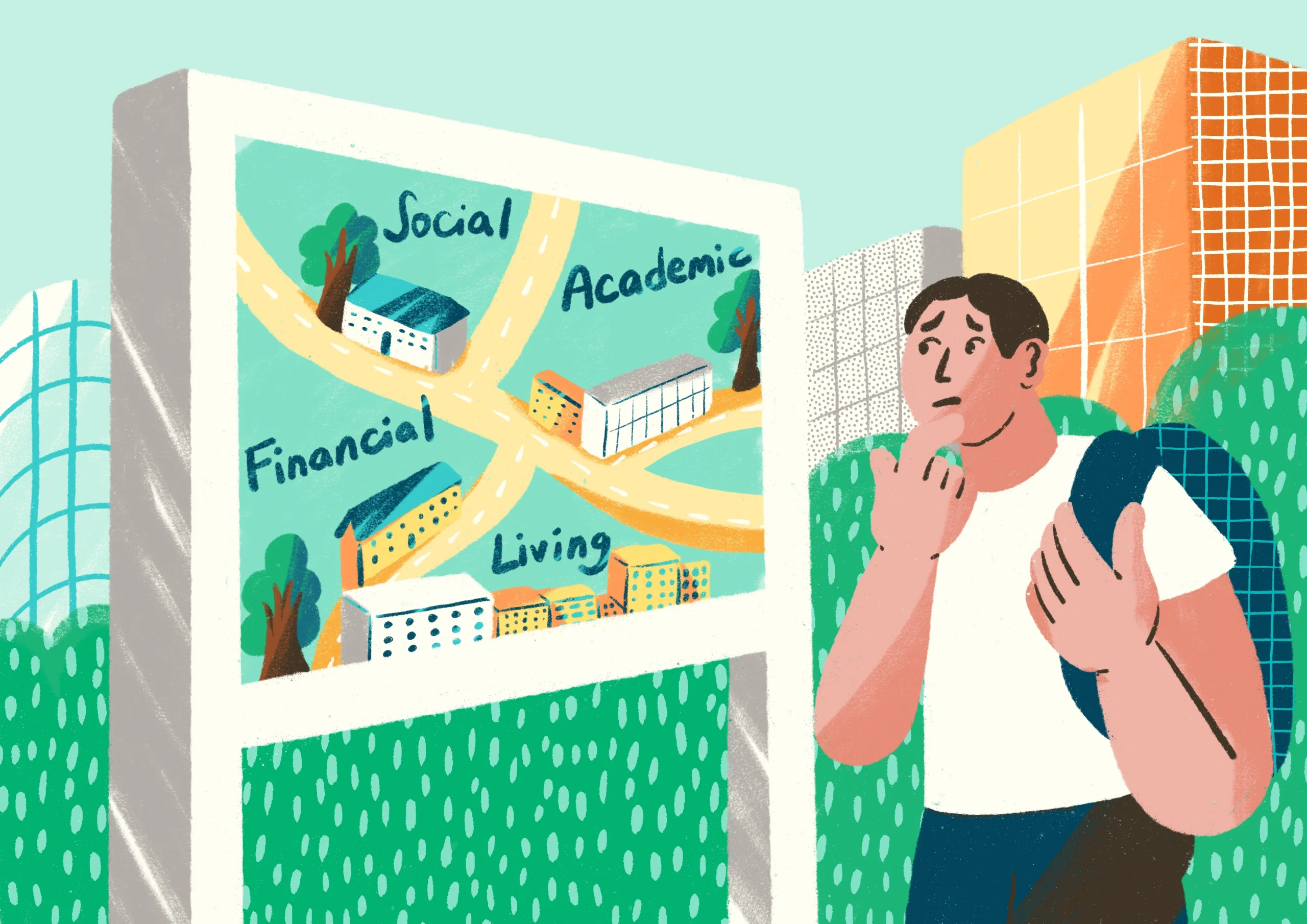Entering university life, freshmen not only face the social and academic challenges mentioned in the first part but also need to adapt to the issues of financial and living independence. In this section, we will help you master management strategies in these areas to more effectively cope with these sources of stress.

3. Financial Aspect
As they transition into university, many freshmen start needing to become financially independent. The need to cover tuition, living expenses, and other costs often pushes them to seek part-time jobs or other sources of income. Juggling the demands of both work and studies can quickly become a huge challenge.
Furthermore, university life often comes with an increase in social activities, each with its own price tag and adding to financial burdens. This is particularly challenging when surrounded by classmates with more stable financial situations who can participate in more activities or even enjoy a more luxurious lifestyle. Such disparities can lead to comparisons among peers, intensifying stress for those grappling with financial strain and making it harder to fully enjoy the university experience.
“ I am totally broke lately!” - How many of you can relate? Many students are indeed grappling with financial stress. Let us look at some important points to consider in financial management as we embark on our university journey:

a. Budget Management: Craft a clear budget plan to keep your finances in check. Prioritize essential expenses like tuition, accommodation, and food, and set limits on your monthly spending for entertainment and social activities to avoid overspending. Utilize this Boon Budget Plan or financial management apps to track and control your expenses, and look for opportunities to save money.
b. Seek financial resources: Explore part-time or flexible work opportunities that fit around your class schedule, helping to minimize interference with your studies. Universities often offer financial aid and scholarship programs, so visit your school's financial aid office to learn about funding options that align with your needs. Additionally, do not overlook external scholarships, student aid organizations, and charities, which can provide valuable financial support.
c. Reduce social financial pressure: In reality, many people share concerns about saving money in social settings but shy away from discussing it due to awkwardness. Bringing it up can often be a relief, allowing everyone to feel more at ease and appreciative of the honest conversation.
Before committing to an event, take a moment to assess whether it fits within your budget. If it does not, feel free to politely decline or suggest more affordable alternatives, like hiking or a day at the beach. When you feel comfortable, have an open conversation about budgeting with your friends to find activities that work for everyone.
4. Living aspect
For many freshmen, dormitory life is a whole new world, marking a major departure from the comforts of home. The leap to living independently means mastering a variety of daily tasks - from managing your health and keeping your room tidy to handling laundry, shopping, and cooking. What might seem like simple chores can quickly become time-consuming and exhausting.
Additionally, transitioning from a family setting to university often brings a shift in identity and responsibilities. With more opportunities to shape their own lives - like choosing courses and managing their time and finances – freshmen need to delicately balance their newfound independence with family needs and desires. This journey of exploration can stir feelings of anxiety and uncertainty.

a. Health management
i. Regular work and rest schedule: Set a consistent work and rest routine to ensure you get enough sleep. Sufficient rest boosts brain function and strengthens your immune system, helping you manage academic pressures and stress more effectively. (If you are experiencing sleep difficulties, we encourage you to explore our free CBT Course for Insomnia)
ii. Balanced diet: Aim for a well-balanced diet that includes sufficient protein, carbohydrates, fruits, vegetables, and healthy fats. Minimize reliance on fast food and sugary snacks, and focus on increasing your intake of fresh produce. Proper nutrition fuels your energy, enhances immunity, and supports overall health1.
iii. Moderate exercise: Incorporate moderate exercise into your routine to improve physical health, relieve stress, and uplift your mood. Choose activities you enjoy - whether it is jogging, swimming, yoga, or aerobics—and aim for three to five sessions per week, each lasting at least 30 minutes.
The DEER concept comes from https://www.bps.org.uk/blog/how-being-deer-can-support-our-mental-health
b. Dorm life tips:
i. Time management: A clutter-free environment not only helps maintain your mood but also makes it easier to stay on top your responsibilities. Ensure you allocate time for essential tasks such as cleaning your room, doing laundry, and shopping. Create a schedule to manage these chores effectively, keeping your dorm tidy and your life organized. Aim to dedicate about 15 minutes each day to household tasks to prevent them from accumulating, which can lead to stress and procrastination.
ii. Share the load: Team up with your roommates to split dormitory chores, like taking turns cleaning common areas and shopping together. This approach not only lightens each person’s burden but also fosters positive relationships and teamwork within your living space.
iii. Learn basic cooking: Master a few simple recipes before you arrive on campus so you can prepare your own meals in the dorm. This not only helps you save money on dining out but also adds a practical skill to your repertoire.
c. Balancing family relationships and independent life:
i. Communication and understanding: Keep open lines of communication with your family. Share your freshman experiences and challenges with them while also recognizing that they are adjusting to your new role as a college student. It is important to understand that this transition affects everyone, and family dynamics might shift. Even if relationships are not perfect, allow yourself the space to navigate these changes gradually, finding a distance that works for everyone.
ii. Independence and autonomy: University is a great environment for gradually cultivating the skills needed for independent thinking and decision-making. Learn to manage your own choices, finances, and time effectively. Embracing these responsibilities will help you navigate university life more independently, lessen your reliance on family, and promote personal growth.
5. Seeking support
If you are feeling confused or challenged in any areas, or experiencing emotional distress, do not hesitate to reach out to your school’s counseling services. They can help you navigate your challenges and provide guidance. Remember, seeking support is a crucial step towards addressing issues and fostering personal growth. Everyone needs help from time to time, and taking this step can lead to meaningful change and growth.
We all navigate through various difficulties and challenges, and I hope the suggestions above can provide you with some guidance in facing the changes and experiences of university life. Trust yourself, and give yourself the time and space to explore your own pace and path.
Co-authors:
Janet SY Fong, Psychological Well-being Officer of Jockey Club TourHeart+ Project
Ruby MY Liu, Well-being Promotion Officer of Jockey Club TourHeart+ Project
Reference:
1. Grajek, M., Krupa-Kotara, K., Białek-Dratwa, A., Sobczyk, K., Grot, M., Kowalski, O., & Staśkiewicz, W. (2022). Nutrition and mental health: A review of current knowledge about the impact of diet on mental health. Frontiers in Nutrition, 9, 943998. https://doi.org/10.3389/fnut.2022.943998.





